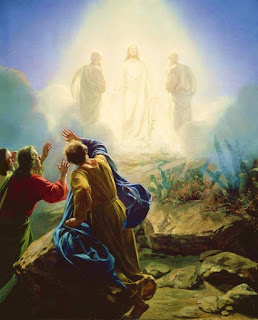He really tried to live what he wrote, someone might
say. And, his topic as a 30-year old stuck with him, so that he wrote some more
over 30 years later to further describe how God’s beauty had affected him.
Perhaps Albert Orsborn went about his job training others with the words of “Let
the Beauty of Jesus Be Seen” on his lips, encouraging others to mimic the Holy
Son’s behavior and attitude. If it was wartime, did his words take on extra
meaning, pushing others to make a little more sacrifice, even in the midst of
deprivation? What he said evidently compelled another writer, George L.
Johnson, to add some more thoughts to Albert’s original composition nearly 20
years after its debut. How does conventional beauty compare to the beauty Albert
and George recognized? Was Jesus most beautiful perhaps when he was transfigured
(See Bloch painting here)?
Albert William Thomas Orsborn was in a position for
most of his life in England and the British Commonwealth to project Jesus’ sacrificial
example for others to see. This most likely was modeled for him by parents who
were active in the Salvation Army, undoubtedly prompting the young Albert to
invest himself in the same organization from his early teens through his senior
citizen years. During World War I, Orsborn was an officer in a training college
for the Salvation Army, where he evidently was when he composed his two verses
of “Let the Beauty…”. We know not the exact circumstances that spurred Albert’s
writing, but 1916 could not have been an easy period to ponder his life, as his
countrymen fought enemies in a brutal European conflict that had spilled over
into other regions of the world, had been raging for two years, and showed no
sign of stopping anytime soon. Could it have been that Albert needed to nurture
a renewed hope in mankind? What better direction to look than straight up? His
2nd verse could suggest he’d had a rough day or several days – ‘somebody
has been unkind to you…word…pierces you through’—and needed to remind himself
that Jesus endured revulsion too. As an officer at the time in the Army’s
training college in London, and watching others train for their duties, Albert
must have felt responsible for presenting the proper model to them, for obeying
his superior officer’s – God’s -- charge. In 1947, Albert must have been still
pondering Jesus’ beauty, when he published a collection of poems entitled “The
Beauty of Jesus”.
George Johnson picked up Albert Orsborn’s theme in
1934 and wrote at least one more verse along the same lines. If you’re having a
rough stretch, and people around you seem uncaring, try on His clothes. George’s
precise situation is no more evident to us than Albert’s, but it’s not hard to
decipher what bothered either man. It’s no different than what ails anyone
today, or has any day. Are your looks ordinary, like mine? Do others think your
looks are average? We all need the therapy Albert and George prescribed.
Brief
biography of one composer here: http://christianity.wikia.com/wiki/Albert_Orsborn
Very scant
reference to other composer here: http://www.hymntime.com/tch/bio/j/o/h/johnson_gl.htm




